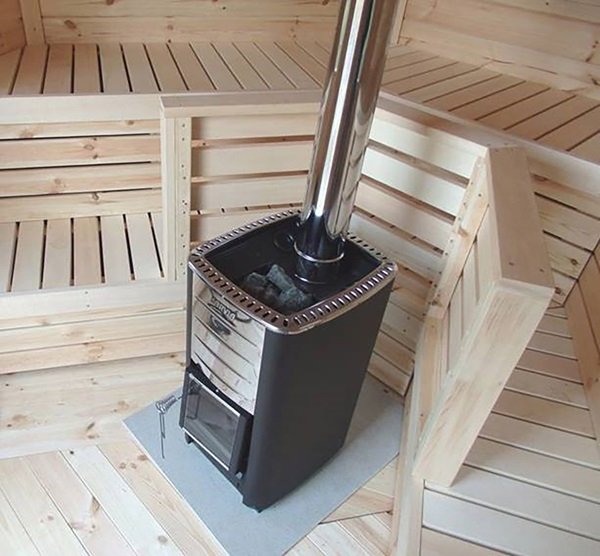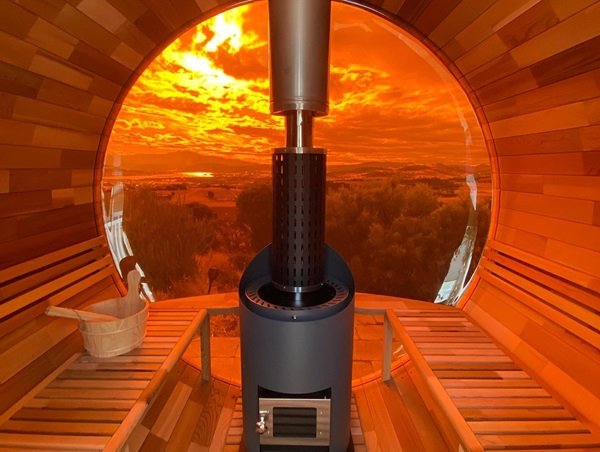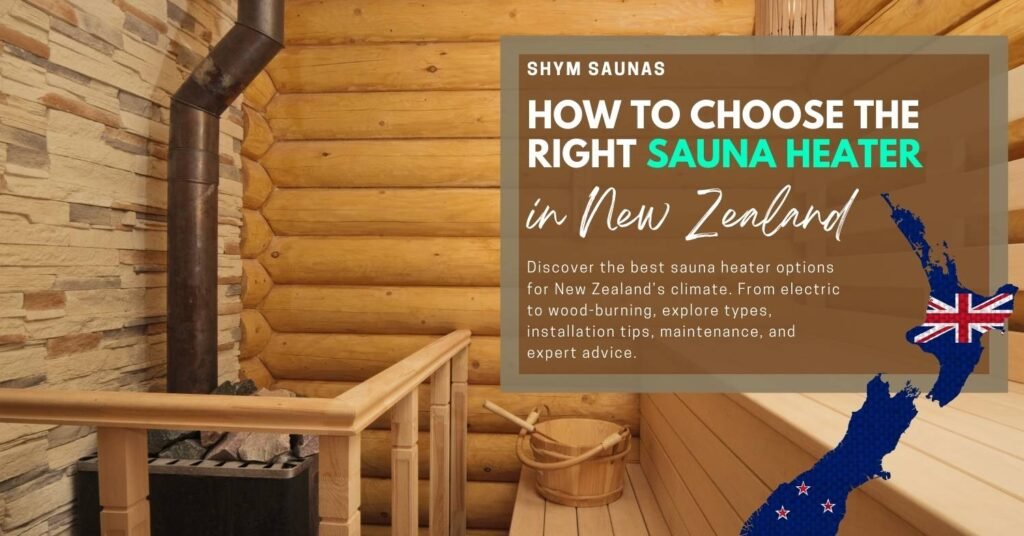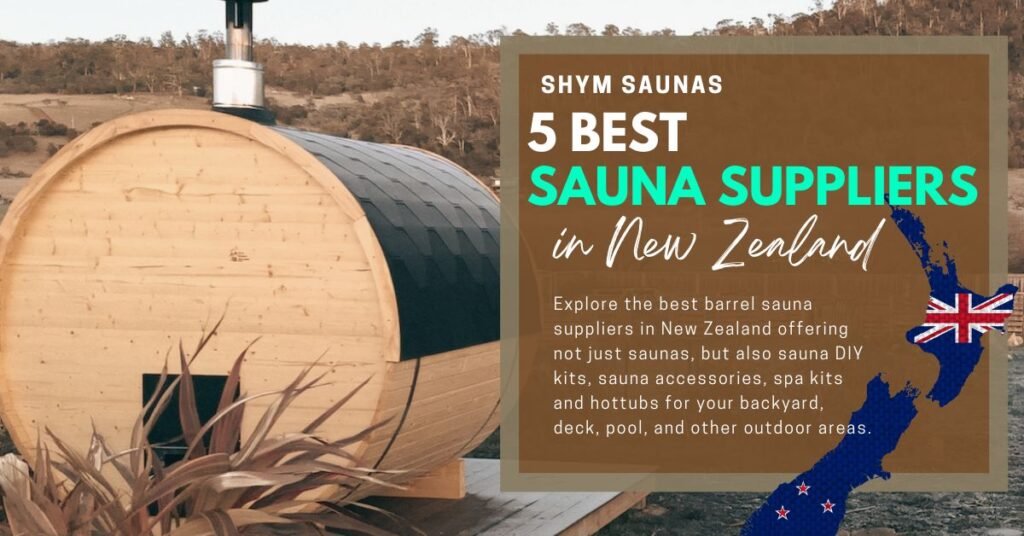Looking to buy the perfect sauna heater in New Zealand? With our country’s unique mix of cooler temperatures and high humidity, choosing the right heater is key to creating a warm, inviting sauna experience that’s also energy-efficient.
Whether you’re after the ease of an electric heater, the rustic charm of wood-burning, or the steady power of gas, this guide has you covered. Let’s dive into the essential considerations, tips, and expert advice you need to find the ideal sauna heater for your New Zealand setup.
Key Takeaways
- Choosing a sauna heater depends on climate, sauna location, and personal preference.
- Electric heaters are convenient for indoor saunas, while wood-burning suits outdoor and rural areas.
- Proper insulation improves efficiency, especially for outdoor or uninsulated saunas.
Choosing the Right Sauna Heater Type
Different types of heaters have unique benefits and maintenance needs, so let’s explore the main types and what might work best for your setup:
Electric Sauna Heaters

HARVIA Sauna Heater The Wall Black (4.5 kW up to 9 kW variations) available at Shym Saunas
Electric heaters are popular for their ease of use and quick heating—perfect for those wanting to enjoy a sauna without the fuss of firewood or gas. They’re ideal for indoor setups or urban areas, where they can plug into a regular power supply.
In this climate, moisture can cause rust and corrosion on metal parts. Protecting electric heaters with moisture-resistant coatings or casings and using silicone-insulated wiring can help extend heater life. Consider adding Ground Fault Circuit Interrupters (GFCIs) for extra protection against moisture-related shocks.
Advantages:
- Fast & Easy: Heats up quickly with just a flip of a switch.
- Precise Temperature Control: Many models let you set and monitor the temperature easily.
- Low Maintenance: Requires little upkeep aside from occasional inspections.
Wood-Burning Sauna Heaters.

HARVIA M3 (16.5 kW) Wood Burning Sauna Heater from Shym Saunas
Wood-burning heaters are traditional and create that authentic sauna experience—complete with the cozy crackle of wood and the aroma that enhances the sauna ambiance. They’re ideal for outdoor saunas or rural areas where access to firewood is easier.
Advantages:
- Natural, Even Heating: Provides a steady, soft heat that many find soothing.
- Authentic Sauna Feel: The scent and sound of burning wood add to the experience.
- Off-Grid Friendly: Doesn’t need electricity, perfect for rural locations.
Things to Consider:
- Wood Storage: New Zealand’s high humidity can make wood damp and hard to burn. Use hardwoods like manuka or oak, which are denser and burn efficiently even in damp conditions.
- Maintenance: Regularly clean ash and inspect chimneys for creosote buildup—humidity can worsen chimney clogging.
- Venting Needs: Wood heaters require ventilation. Outdoor saunas or designated chimney systems are essential.
Read More: Electric vs. Firewood Sauna Heaters – What’s Right for You?
Gas Sauna Heaters
Although less common, gas heaters are an efficient option for larger saunas, offering powerful heat for those with access to propane or natural gas. They’re efficient but needs professional installation, and are often used in large and commercial sauna installations.
Advantages:
- Consistent Heat: Gas heaters provide strong, steady warmth, ideal for larger saunas.
- Fast Heating: Reaches desired temperatures quickly.
- Lower Operating Costs: Natural gas can be economical in the long run.
Things to Consider:
- Installation Requirements: Must be professionally installed with proper ventilation.
- Access to Gas: Best for areas with easy gas supply access—often not ideal for remote locations.
What to Consider when Buying a Sauna Heater?
Choosing the right heater size is essential to creating a warm, cozy sauna experience without straining your heater or energy bill. Here’s a breakdown of what to keep in mind:
Sauna Size and Heater Power Requirements
- To find the right size heater, calculate your sauna’s volume (Length x Width x Height) in cubic meters.
- Generally, 1 kW is required per 1.25 cubic meters. For uninsulated or outdoor saunas, add 25-30% to compensate for faster heat loss.
| Sauna Volume | Suggested Heater Power | Power Increase for Outdoor/Uninsulated |
| Up to 5 m³ | 4.5 kW | 5.5 – 6 kW |
| 5 – 9 m³ | 6 – 8 kW | 8 – 10 kW |
| 9 – 14 m³ | 9 kW | 10.5 – 12 kW |
| 15+ m³ | 10.5+ kW | 12.5+ kW |
Example Calculation:
- A 10 m³ indoor sauna needs an 8 kW heater.
- An outdoor sauna of the same size would require around 10 kW to offset heat loss due to insulation limitations and exposure.
Read More: Ultimate Buying Guide for Sauna Heater 2024
Installation Considerations
Outdoor saunas in New Zealand’s humid, variable climate need added moisture control measures to protect components from corrosion and mold. For electric heaters, weather-resistant, heat-tolerant materials like silicone-insulated wiring and metal conduits help resist moisture.
1. Additionally, applying moisture-resistant coatings to heaters and control panels can reduce condensation-related damage.
2. Ensuring proper ventilation, regular rust checks, and using GFCIs for electrical safety will keep your sauna safe and functional.
3. For wood materials, humidity causes mold and warping. Using water-resistant wood like cedar, combined with protective finishes such as linseed oil, can prevent mold and deterioration.
4. Regular maintenance, stable foundations, and consistent ventilation can further help prevent moisture buildup.
Tips for Outdoor Sauna Installation

Outdoor installation comes with extra precautions, but the scenic view is very rewarding.
1. Weather Protection
Outdoor saunas need extra protection against New Zealand’s frequent rain and humidity. Consider adding a roof or using moisture-resistant materials around your sauna and heater. You can also opt for sauna shingles to prevent damage and leaks from rain and snow.
Read More: Do Barrel Saunas Need a Roof? Exploring Weather Protection Options
2. Heat Retention
Barrel saunas are a fantastic option for outdoor setups, as their rounded shape improves heat retention and reduces warm-up time. Consider using well-insulating wood like cedar to trap warmth effectively, reducing power or wood consumption.
Wrapping Up
Electric heaters are convenient for indoor setups, while wood-burning options add ambiance to outdoor saunas. Make sure to choose a heater that matches your space and climate needs, and take steps to protect it from New Zealand’s high humidity and frequent rainfall.
Whether you’re looking for electric or wood-burning sauna heaters, Shym Saunas can help you find the perfect option. Browse our range of high-quality heaters tailored for New Zealand, or contact us for personalized advice. Let us help make your sauna a relaxing retreat in any weather.
FAQs
Does New Zealand’s humidity affect sauna heaters?
Yes, high humidity can cause corrosion in electric heaters and damp wood for wood-burning heaters. Weatherproofing and dry storage help protect heaters.
How should I store firewood for a sauna in a humid climate?
Keep firewood dry by storing it in a raised, covered location. Use dense hardwoods like manuka or oak for better moisture resistance and efficient burning.
How do I calculate the correct sauna heater size?
Measure sauna volume and use 1 kW per 1.25 cubic meters. Add 25-30% for uninsulated or outdoor saunas to maintain optimal temperatures.
Are gas sauna heaters practical in New Zealand?
Gas heaters work well for larger saunas but need access to propane or natural gas and professional installation, making them best suited for larger setups or commercial saunas.



